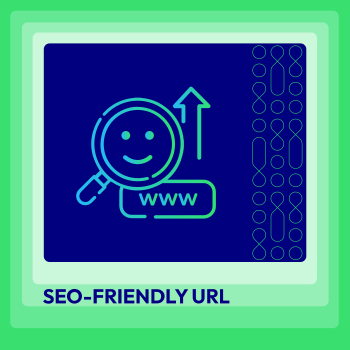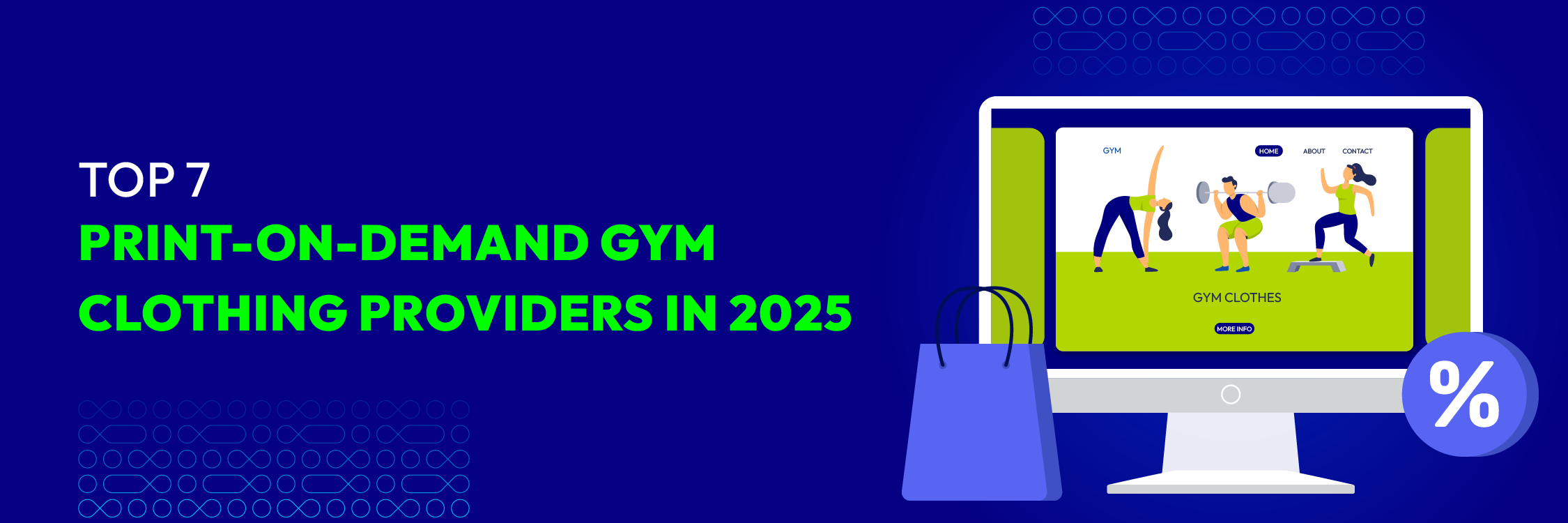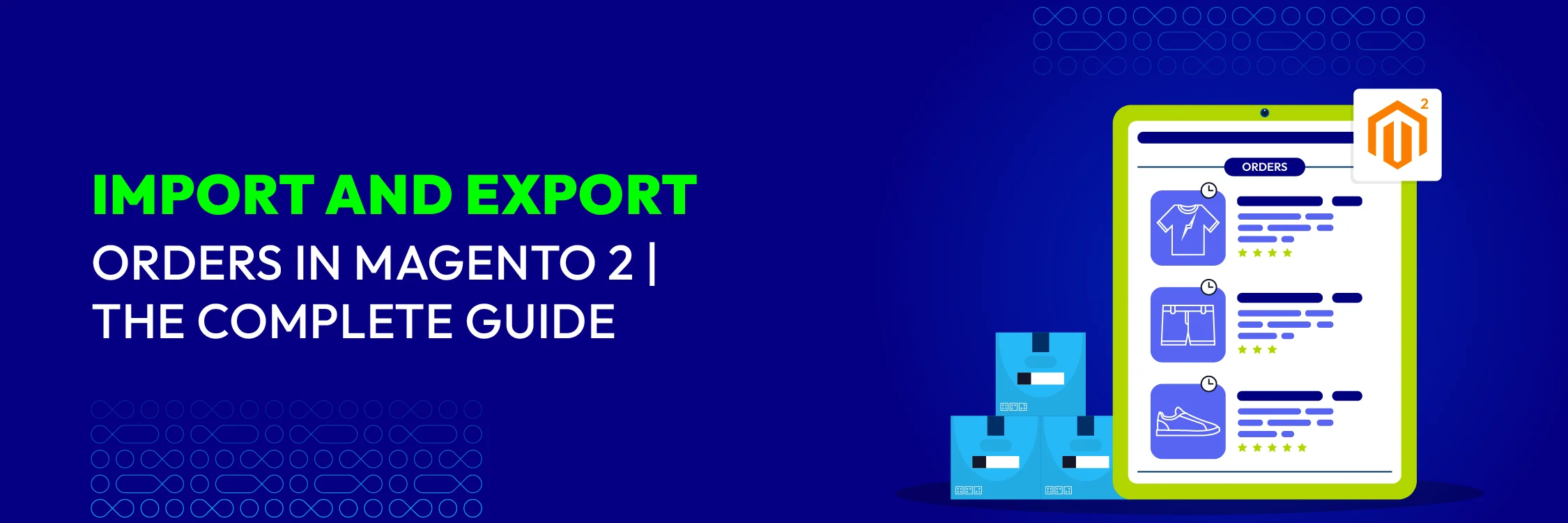Boosting Sales with Strategic Keyword Research for E-commerce
Summer Nguyen | 12-18-2024

As a business owner, you should know how important keyword research is. Many entrepreneurs focus on creating a beautiful website and a perfect product but forget about the power of keywords.
Keyword research is the key to unlocking more traffic and sales for your e-commerce business. If you know what your target consumers are looking for, you can better tailor your website and product pages to increase your visibility in the SERPs. When people search for products or services like yours, your website will show up more often. This can bring more people to your site and lead to more sales.
So, if you’re serious about growing your e-commerce business, keyword research for eCommerce is a must-do.
In this article, you will uncover valuable insights and tips on effective keyword research for e-commerce success. Join us to maximize keyword potential and grow your online business.
Importance of Keyword Research for eCommerce
Keyword research for e-commerce involves finding and picking the best keywords that potential customers are likely to use when they search for products or services online. It’s a crucial part of SEO and digital marketing for e-commerce. The aim is to grasp how your target audience searches and talks about products so that you can improve your product listings, website content, and online ads accordingly.

Efficient keyword research allows you to pinpoint search terms relevant to your product and audience. When you incorporate these keywords into your website content, product descriptions, and ads, it boosts your search engine visibility and draws more potential customers to your site.
Keyword research also helps e-commerce businesses understand the needs and preferences of their target audience. By examining people’s queries, you can gain insights into what they are looking for, their pain points, and what language they use to describe your products. This information can be used to improve your product descriptions, website content, and advertising campaigns, making them more relevant and appealing to your target audience.
Magento SEO Services
by Mageplaza
Let experienced professionals optimize your website's ranking
Learn moreFactors to Consider When Researching Keywords
When you embark on the journey of e-commerce keyword research, you’re not just diving into a pool of words; you’re unlocking the door to online success. Picture this: you’re navigating a treasure map, and each keyword is a potential gem waiting to be discovered. But how do you decide which gems to pick up? So, when researching keywords for e-commerce, there are several factors to consider. These include search volume, competition, keyword difficulty, and user intent.
Search Volume
Search volume refers to the number of times a particular keyword is searched for on search engines. It is an important factor to consider when researching keywords because it gives you an idea of how many people are looking for products or services related to that keyword. It is vital to find a balance between high search volume and low competition, as keywords with a high number of searches are typically more competitive and tougher to rank for.
Here’s how to consider search volume:
-
High Search Volume: Keywords with high search volumes indicate a large audience actively searching for that term. Targeting such keywords can bring more traffic to your site, but they often come with higher competition.
-
Low Search Volume: Keywords with low search volumes may have less competition but also attract fewer visitors. However, they can be valuable for targeting niche or specific audiences.
Competition
Competition refers to the number of websites that are trying to rank for a particular keyword. Keywords with high competition are usually harder to rank for, while keywords with low competition are easier to rank for. It’s important to choose keywords with low competition to increase your chances of ranking higher in search engine results pages (SERPs).
-
High Competition: Keywords with high competition are often associated with established websites and brands. Ranking or bidding for these keywords may require significant time and resources.
-
Low Competition: Keywords with low competition are easier to rank for or advertise for. They can be a strategic choice, especially for newer websites or businesses looking for quick wins.
Keyword Difficulty
Keyword difficulty is a metric that estimates how hard it is to rank for a particular keyword. It takes into account factors such as competition, search volume, and the quality of the websites that are already ranking for that keyword. Keywords with high difficulty scores are usually harder to rank for, while keywords with low difficulty scores are easier to rank for.
-
High Keyword Difficulty: Keywords with high difficulty scores are harder to rank for, especially if your website is relatively new or lacks authority. These keywords often require a comprehensive SEO strategy.
-
Low Keyword Difficulty: Low-difficulty keywords are more attainable targets, particularly for newer websites. They offer a better chance of ranking well with less effort.
Keyword difficulty helps you prioritize your keyword targets and focus your optimization efforts on keywords that align with your website’s capabilities.
User Intent
User intent signifies the purpose behind an individual’s search for a specific keyword. There are four main types of user intent: informational, commercial, navigational, and transactional. In order to create content that meets the wants and expectations of your target audience, you should understand user intent when picking keywords.
-
Informational Intent: Users with informational intent are seeking answers or knowledge. Targeting informational keywords can help you create educational content and position your brand as an authority in your niche.
-
Transactional Intent: Users with transactional intent are looking to make a purchase or take a specific action. E-commerce websites should target transactional keywords to drive sales.
-
Navigational Intent: Users with navigational intent are trying to reach a specific website or page. Optimizing for branded keywords can help users find your site directly.
-
Commercial Intent: Commercial intent keywords indicate users are in the research or comparison phase before making a purchase decision. These keywords are valuable for e-commerce businesses.
Tools to Help You Research eCommerce Keywords
You’re not alone in your search for the ideal keywords in the huge field of e-commerce keyword research. Consider it like forming a squad of digital detectives, each with their own set of tools. These tools are your trustworthy companions, guiding you through the maze of online searches. Here are a few of the most well-known names that you have undoubtedly heard:
Ahrefs
Ahrefs is a powerful SEO toolset that can help e-commerce businesses of all sizes grow their traffic and sales. With its comprehensive keyword research features, Ahrefs can assist you in pinpointing the appropriate keywords to focus on, enhancing your product page’s SEO, and crafting long-tail keyword content that boosts both traffic and conversions.

Here are some Ahrefs features for researching e-commerce keywords:
Keyword Generator
- Find thousands of keyword ideas in seconds.
- Filter by search volume, Keyword Difficulty, cost-per-click, SERP features, word count, and more.
- Find long-tail keywords and subtopics for your niche.
- Find keywords for Google, Bing, YouTube, Amazon, and other search engines.
Keywords Explorer
- Analyze the SEO metrics of any keyword, such as monthly search volume, click-through rate, Keyword Difficulty, return rate, and more.
- See the current top-ranking pages for any keyword and their estimated organic traffic. Research keywords for 243 countries.
Site Explorer
- In-depth analysis of any website’s backlink profile, organic traffic, and ranking keywords.
- Spy on your competitors’ SEO strategies and find gaps and opportunities for your own website.
Content Explorer
- Discover the most popular content for any topic or keyword.
- Filter by social shares, organic traffic, referring domains, word count, and more.
- Find content gaps and opportunities for your own website.
Semrush
SEMrush is an all-in-one marketing toolkit that helps businesses improve their online visibility and discover marketing insights. It provides a diverse array of tools and reports that can be used for SEO, PPC, social media marketing, content marketing, and more.
SEMrush is best known for its keyword research tools, which help businesses find the right keywords to target for their website and marketing campaigns. SEMrush also has a wide range of other tools, such as competitor research tools, on-page SEO analysis tools, backlink analysis tools, and content marketing tools.

Here are some SEMrush features for researching e-commerce keywords:
Keyword Magic Tool
Based on a seed keyword, it generates a huge list of keyword ideas. including related keywords, long-tail keywords, and question keywords. You can then filter the list by search volume, keyword difficulty, and other factors.
- E-commerce Keywords Analytics
Providing insights into how keywords are performing on major e-commerce platforms, such as Amazon and eBay. You can see search volume, click-through rate (CTR), conversion rate (CVR), and other metrics for each keyword, so you can focus on the keywords that are driving the most traffic and sales.
- Organic Research
This is a competitive intelligence powerhouse, showing you which keywords your competitors are ranking for in search engines. You can also see their estimated traffic from each keyword and identify opportunities to outrank them.
- Keyword Difficulty Tool
This tool is a must-have for any SEO, assessing the difficulty of ranking for a particular keyword. This helps you prioritize your keyword targeting strategy and focus on keywords that are achievable within your budget and timeline.
- Keyword Gap
This tool is a game-changer for e-commerce businesses, comparing your keyword rankings to those of your competitors. This helps you identify keywords that you are missing out on, so you can add them to your keyword targeting strategy.
Google Search Console
Google Search Console is a free keyword research tool provided by Google that helps you monitor and maintain your website’s presence in search engine results pages. It provides information on search queries, impressions, and click-through rates, which can help you identify keywords that are driving traffic to your site.

Here are some Google Search Console features for researching e-commerce keywords:
- Search Analytics report
Showing you the keywords that your website is ranking for in search results, as well as the click-through rate (CTR) and average position for each keyword. You can use this information to identify high-performing keywords, track keyword performance over time, and identify new keyword opportunities.
- Keywords report
Every keyword your site is currently ranking for is listed here, along with the search volume, competition, and related keywords for each keyword. You can identify new keywords that are relevant to your business and that have a high search volume but low competition.
- Search Queries Report
Showing you a list of all the search queries that people used to find your website. This information might help you find relevant long-tail keywords and fresh ideas for blog posts.
- Pages report
Listing the most popular pages on your site that people are finding through search engines. You can identify high-performing pages that you can optimize for additional keywords.
- Links report
Showing you backlinks from other websites to your own. Backlinks serve as a signal to Google, signifying the authority and reliability of your website, so identifying and building backlinks from high-quality websites can help to improve your keyword ranking.
Moz
Moz is a leading digital marketing software and analytics platform that empowers businesses to enhance their online presence and visibility. Moz provides a comprehensive suite of keyword research tools and resources, making it the go-to choice of marketers, SEO professionals, and e-commerce businesses who want to succeed in today’s cutthroat digital marketplace.
One of Moz’s standout features is its robust suite of tools designed specifically for researching e-commerce keywords. Whether you’re running an online store or managing a digital marketing campaign for an e-commerce website, Moz provides you with the insights and data needed to discover the most relevant and lucrative keywords for your niche. These features enable you to optimize your content, boost search engine rankings, and ultimately drive more organic traffic to your e-commerce site.

Here are some Google Search Console features for researching e-commerce keywords:
- Competitor Analysis: Analyze competitors’ keyword strategies.
- Link Explorer: Analyze backlink profiles for SEO improvement.
- Keyword Explorer: Using a seed keyword to generate a list of related keywords will help you find fresh keyword prospects. You can then filter the list by search volume, keyword difficulty, and other criteria.
- Keyword Difficulty: Assesses the difficulty of ranking for a particular keyword. This will help you prioritize your keyword targeting strategy and focus on keywords that are achievable within your budget and timeline.
- SERP Analysis: Provides insights into the top-ranking pages for a particular keyword. You can see the title tags, meta descriptions, and other on-page - SEO factors of the top-ranking pages. This information can help you optimize your own pages for the same keyword.
- Rank Tracker: Tracks your website’s keyword rankings over time. This helps you see the impact of your keyword research and SEO efforts.
- On-Page Optimization: Analyzes your website’s on-page SEO and provides suggestions for improvement, improving your ranking potential for your target keywords.
Google Keyword Planner
Google Keyword Planner is a powerful and indispensable tool for anyone involved in online marketing and e-commerce. Developed by Google, this free tool is designed to help businesses and advertisers discover, analyze, and select the most effective keywords to reach their target audience.

Here are some Google Keyword Planner features for researching e-commerce keywords:
- Keyword Explorer: Keyword Explorer is a powerful keyword research tool that provides insights into keyword search volume, competition, and related keywords. It also includes a number of features that are specifically designed for e-commerce businesses, such as the ability to filter keywords by product category and intent.
- Link Explorer: Link Explorer is a backlink analysis tool that can help you identify and understand your website’s backlink profile. Link Explorer can help you identify high-quality backlinks from relevant websites, which helps you rank higher in SERPs.
- MozBar: MozBar is a browser extension that provides real-time SEO metrics for any website you visit. This includes metrics such as domain authority, page authority, and link metrics. MozBar can be a helpful tool for quick keyword research and SEO analysis.
- Track keyword performance: Businesses can measure the effectiveness of SEO campaigns and identify areas for improvement.
Google Autocomplete, People Also Ask, and Related Search
Google Autocomplete, People Also Ask, and Related Search are features of Google’s search engine that can help you identify related keywords and search queries. Let’s explore how each of these amazing features can work wonders for you:
Google Autocomplete: Google Autocomplete, also known as “Google Suggest,” offers keyword suggestions as users start typing in the search bar. It provides real-time, popular search queries related to the initial keywords.
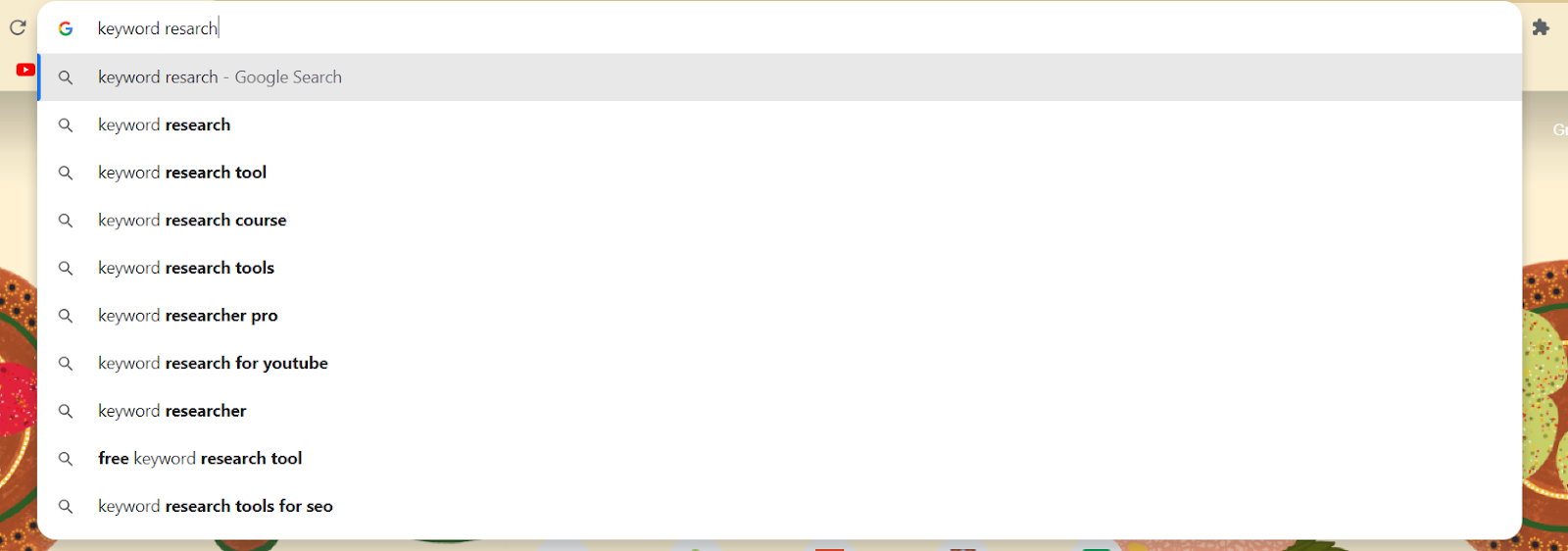
How it helps businesses: Businesses can use Google Autocomplete to discover long-tail keywords and popular search queries that users are actively searching for. This feature is great for uncovering user intent and understanding what potential customers are looking for.
People Also Ask (PAA): People Also Ask is a Google search feature that displays a box of related questions and answers within search results. These questions are often semantically related to the initial search query.
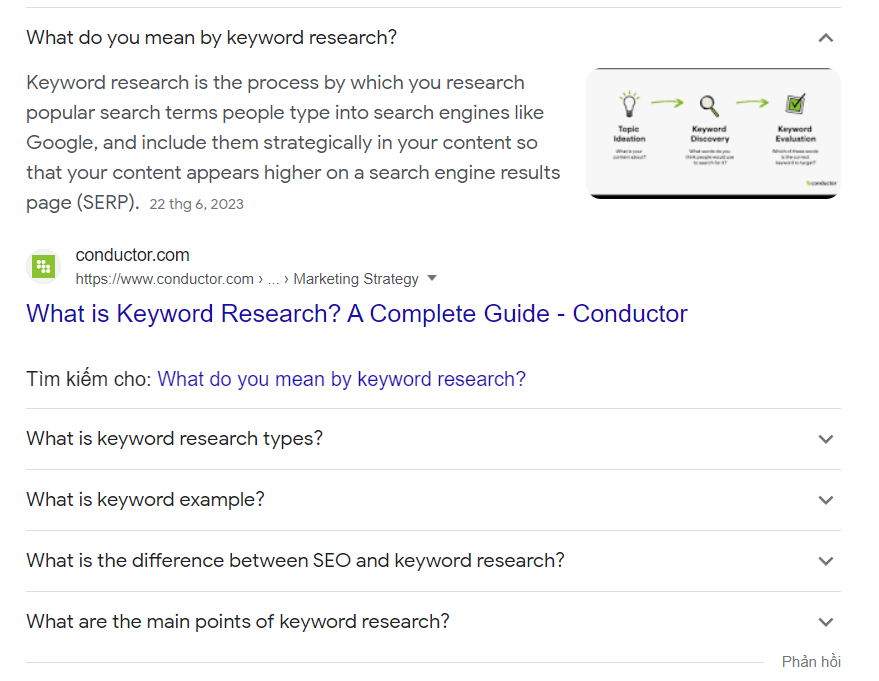
How it helps businesses: PAA provides insights into the broader context and user intent behind specific e-commerce keywords. It helps businesses understand what additional information or products users may be interested in. E-commerce businesses can use PAA to identify content gaps and address common user questions with their product listings or content.
Related Search: The “Related Search” feature appears at the bottom of Google’s search results page and suggests additional search queries that are related to the initial keyword.
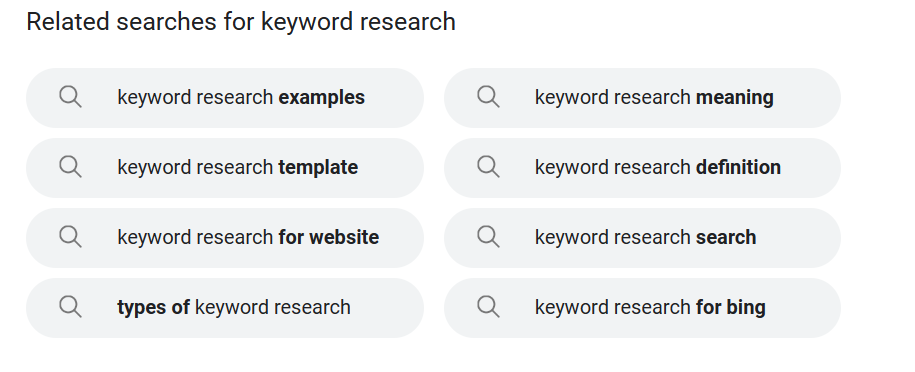
How it helps businesses: Businesses can use Related Search to discover variations and synonyms of their target e-commerce keywords. It helps expand the keyword list for product listings, content creation, and optimization.
Take Inspiration from Your Competitor’s Keywords
Another way to find new keywords to target is to analyze your competitors’ websites. Examine the keywords they’re using in their content, product descriptions, and advertising campaigns. This can give you ideas for new keywords to target that you may not have thought of before. Taking inspiration from your competitors’ keywords can be a valuable strategy for researching e-commerce keywords and improving your online visibility. Here’s how it helps:
-
Identifying Relevant Keywords: Analyzing your competitors’ keywords reveals terms and phrases they are actively targeting. This can help you discover relevant keywords in your niche that you might not have considered.
-
Understanding User Intent: Gain insights into the specific topics and products that are of interest to your target audience. This understanding of user intent can guide your content and product optimization efforts.
-
Competitive Analysis: You may learn a lot about your competition’s strengths and shortcomings in the e-commerce world by looking at the keywords for which they rank. You can figure out where they’re weak in their tactics and exploit those areas.
-
Keyword Variations: Competitors often target a variety of keyword variations. By studying their keyword choices, you can identify different ways people search for products or services similar to yours, helping you broaden your keyword list.
The Power of Effective Keyword Research for eCommerce Success
Keyword research is an essential part of any e-commerce business’s digital marketing strategy. You may improve your search engine rankings and receive more visitors to your site if you optimize for the phrases that are most relevant to your product and your target audience. When researching keywords, it’s important to consider factors such as search volume, competition, keyword difficulty, and user intent.
There are many tools available to help you research e-commerce keywords, including Ahrefs, Semrush, Google Search Console, Google Autocomplete, People Also Ask, Related Search, Moz, and Google Keyword Planner. By using these tools, you can identify new keywords to target and gain insights into the needs and preferences of your target audience.
In conclusion, effective keyword research is the key to maximizing your sales potential and achieving e-commerce success. So, take the time to research your keywords carefully and use them wisely in your website content, product descriptions, and advertising campaigns.



